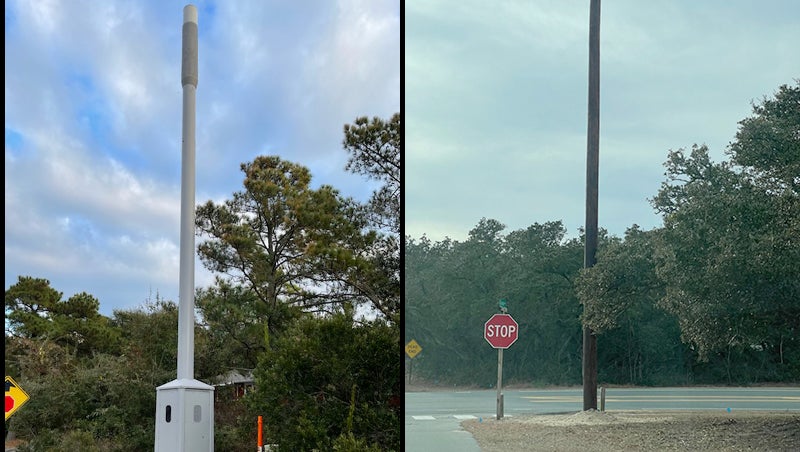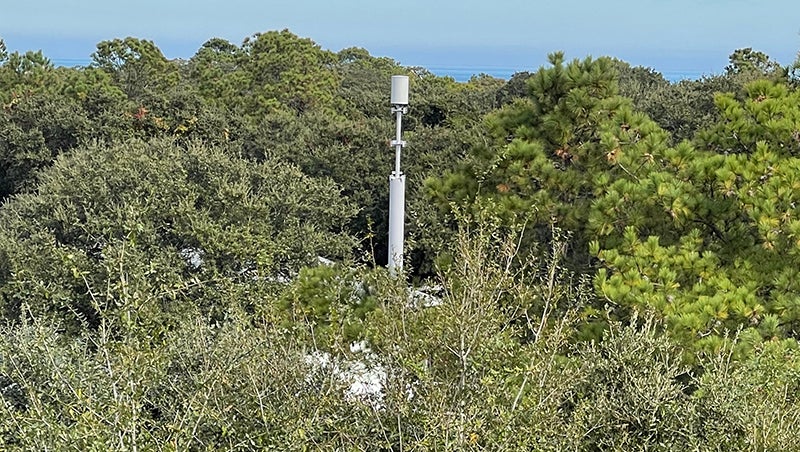Southern Shores puts brakes on new cell towers
Published 8:11 am Thursday, April 21, 2022
|
Getting your Trinity Audio player ready...
|
The Southern Shores Town Council voted to include small wireless facilities located in the town right of way in the requirements for underground utilities, thereby prohibiting any new installations of cell towers.
The amendment comes after several years of frustrations and misunderstandings.
In March 2018, Southern Shores amended the town code to allow small wireless facilities and new utility poles following HB 310 in 2017 that stated “a city shall not prohibit, regulate, or charge for the collocation of small wireless facilities.”
Since then, 10 of these small wireless facilities were permitted and installed throughout town, primarily by Verizon and UScellular. Those in town rights of way were required to go through the town’s permitting process; those in the state right of way needed only to acquire an electrical permit but otherwise do not need authorization from the town. One of the most recent, located at on the corner of Hickory and Wax Myrtle, gained a significant amount of attention because the pole was of metal construction and impaired homeowners’ ocean view.
“We had seen an article in this paper about its birth, but nothing prepared us for this beauty,” wrote Southern Shores resident Russ Watkins in a cleverly sarcastic Letter to the Editor of The Coastland Times. “SS town team members are providing contacts for the wizards behind the screen who really have free reign it seems to find the best spot and put one up. And guess what, we don’t remember receiving a letter, email, or twitter letting us know a potential planting spot had been located about 150 yds from our lot.”
Watkins called attention to an important point: What exactly is the process for selecting a cell site?
In a letter to Southern Shores Mayor Elizabeth Morey, Watkins wrote, “We’re all for progress, and I definitely support the improvement of local wireless communication. We are just saddened by the fact that this particular improvement has been built in clear view from our top floor.”
According to UScellular, the company who installed the pole at Wax Myrtle, “When we review prospective locations for cell sites, we take several things into consideration, including terrain, aesthetics, availability of land, and community or public safety need,” said Jeremy Taylor, director of sales for UScellular in eastern North Carolina.
“Ultimately, we want to place our towers in spots that provide our customers with the best wireless connection. Whenever adding a new cell site, it is our standard practice to ensure that it aligns with health, safety and environmental guidelines set forth by the FCC, and they meet all standards and requirements of the FAA, state and local governments, as well as the city’s building, electrical, mechanical and other applicable codes,” Taylor continued.
However, Southern Shores saw an uptick in cell cite requests while neighboring towns did not. Turns out, other municipalities created or maintained the requirement that all utilities must be underground, thereby eliminating the possibility of cell towers in town rights of way.
The state statute does allow for circumstances when the local municipality may deny an application: if “… it does not meet any of the following: (i) the city’s applicable codes, (ii) local code provisions or regulations that concern public safety, objective design standards for decorative utility poles, city utility poles, or reasonable and nondiscriminatory stealth and concealment requirements, including screening or landscaping for ground-mounted equipment, (iii) public safety and reasonable spacing requirements concerning the location of ground-mounted equipment in a right-of-way, or (iv) the historic preservation requirements.”
Morey, who was on the planning board in 2018 when the town changed the ordinance to allow the small wireless facilities, recalled “We put it in the ordinance because we were told that we basically had no choice. [State legislators] passed the statute without taking into consideration the impact to local communities who are almost all underground utilities – which is what we are here in Southern Shores – so we passed it because our attorney told us to do that, so that’s what we did. Now other towns didn’t. They went with the underground option, and their cell service isn’t any worse or better than ours.”
Some residents, however, do see the amendment as a sacrifice for increased connectivity and better coverage.
“Wider service is no longer an indulgence or a luxury, it’s a necessary utility like water, electricity or land-based telephone,” said resident Erik Nohre during the public comment portion of the April 7 council meeting. “We live in a small town where wireless companies have a small number of paying customers, and we’re lucky that they’re even willing to invest any money into our infrastructure at all. Making it more difficult for them in the form of these waivers and variances or whatever is decided will hurt their return on investment and make them less likely to invest in our town.”
Nohre said that the only negative impact he’s heard discussed is the aesthetics of the poles. He cited factors that he considered more important, like EMS access, coverage for people who work from home and even home values.
“What we’ve discussed tonight is pretty much going to kill wireless access expansion. Also, making the wireless companies go underground, you’re actually, I believe . . . being a little discriminating against them because you’re literally putting them where they’re not going to work. You’d be like telling Dominion to put their lines in the ocean or worse, septics on top of the soil. It’s not how they are designed and this ZTA purposefully exploits that,” Nohre continued.
Town staff doesn’t see the amendment as killing wireless access expansion, but rather slowing it down.
“This gives you that opportunity to kind of tap the brakes. It gives us an opportunity to have a little bit more say and control over where these poles are located right now,” said town manager Cliff Ogburn. “As it’s written, with that engineer seal, these poles could go up just about anywhere in town and it’s very difficult for us to put the brakes on that.”
Regarding the concern that residents may need to increased speed possibly associated with the cell towers, Ogburn said to commissioners, “You have the waiver and so you still have the ability and you can make the decision that this pole here [for example] is going to be a benefit to our community for the folks that are working from home and need to be able to get [increased] download speed.”
Even in locations where the small wireless facilities have been installed, some residents say they haven’t noticed a difference.
Anthony diBernardo, who lives near the recently installed cell tower on Ninth Avenue, said during public comment, “I don’t know why it was installed. I’ve never had bad service – never . . . I’m not arguing that it’s there I’m just saying I don’t know why it’s there. I really think that it has to be looked at when they apply for something like this and really look at where the service is. I think that a variance would help with that so they could state their case.”
Mayor Pro Tem Matt Neal summed up the sentiment of the council: “I think [this decision] is right. This was passed in 2017 with 5G in mind – ‘5G is going to bring jobs! It’s going to bring commerce! It’s going to make our state more competitive!’ – and we haven’t really seen that, not yet, and so I think this is more about the competition. One provider wanting to get a leg up in 5G and be better positioned to take away the business from another provider. But I think really and truly this just gives you the ability to have a little more say and a little more control over the placement of these poles in your town.”








